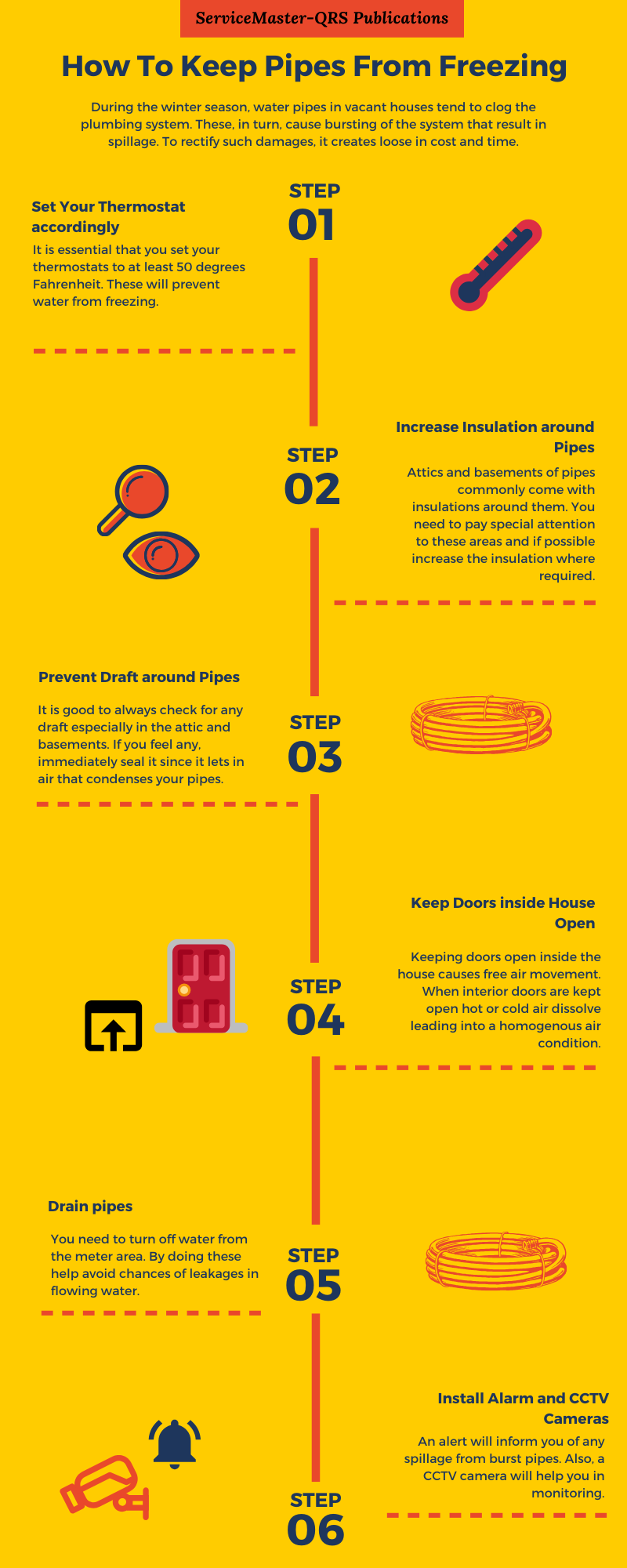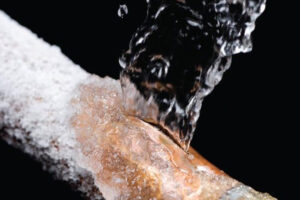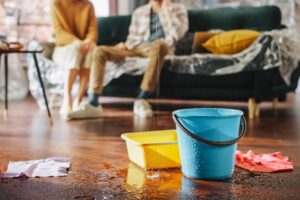
Have you ever found yourself in a situation where you experienced water leakages from pipes in your house? What might have been the cause and how did you deal with it? This is among the few problems most residential people encounter in their homes. It is an effect of the bursting of frozen pipes. This is a problem, especially during the winter season in Chicago.
During the winter season, water pipes in vacant houses tend to clog the plumbing system. These, in turn, cause the bursting of the system, resulting in spillage. Rectifying such damages requires high costs and time. You will also need knowledge about water damage restoration, emergency flood cleanup, water removal services, and sewage cleanup. Such information you can always get from expert plumbers. The average cost of pipe repair would not be below $2, 500. This article will give you tips on how to prevent pipes from freezing in vacant houses.
1. Set Your Thermostat Accordingly
It is essential that you set your thermostats to at least 50 degrees Fahrenheit. These will prevent water from freezing. Given that this is just a general recommendation, there still is a need to adjust the temperatures with time as per the change in seasonal weather.
When the temperature goes too low, raise the temperature thermostat to at least 55 degrees Fahrenheit. It is advisable to consult an expert in plumbing to help you with this if required.
2. Increase Insulations Around Pipes
Attics and basements of pipes commonly come with insulations around them. You need to pay special attention to these areas and if possible increase the insulation where required. You can use a unique form of a sleeve made from fiberglass or foam rubber. These two work best for insulating your pipes.
3. Prevent Draft Around Pipes
It is good to always check for any draft, especially in the attic and basements. If you feel any, immediately seal it since it lets in air that condenses your pipes. Also, note that cracks in houses let air in the house that exposes your pipes to cold, hence causing freezing. Keep your pipes warm always.
4. Keep Doors inside the House Open
Keeping doors open inside the house causes free air movement. When interior doors are kept open, hot or cold air dissolves, leading to a homogenous air condition. If you have pipes inside cabinets, it is good to keep them open as well. All these ensure harmonized air condition in the rooms, hence no freezing can easily occur.
5. Drain Pipes
You need to turn off the water from the meter area. Doing this helps avoid chances of leakages in flowing water. It is also crucial to drain off water in all pipes and let them stay dry. Dry pipes will not experience freezing due to the lack of water expansion.
6. Install Alarm and CCTV Cameras
Responding to an emergency case requires something that will quickly notify you when it happens. In this case, it is good to install an alarm in your house. An alert will inform you of any spillage from burst pipes. Also, a CCTV camera will help you in monitoring. You will daily take a look at CCTV footage about the condition of your house and act accordingly.
Further, if you are not available, it is good to have a trustworthy person to make a quick checkup in all the rooms and report the feedback to you. This can be done once or twice a week.
7. Keep Garage Doors Closed When Not in Use
Sometimes the garage door seems to be an extension of the living space, but it’s an outdoor space that can let in extreme cold if not monitored. Keep your garage doors closed when not in use, and you can even buy a device called a TTC, it’s time to close, which will automatically close your garage door if left open for the pre-set amount of time.
Any person, experiencing and paying the cost to repair burst pipes and clean the house, realizes that it’s very annoying and inconvenient. It is therefore vital to prevent such expenses through proper home and water pipe management.
Why Choose ServiceMaster Quality Restoration Services?
- Available 24/7, Every Day of the Year
- 25 Years of Experience
- Navigate the Insurance Process With Ease
- Full-Service Restoration Company
- IICRC Certified Firm
- Comprehensive Training and Certification
- Locally Owned and Operated

Make an Appointment With Our Restoration Experts
If you’re facing the chaos of water damage due to frozen pipes in Chicago, IL, or the surrounding suburban areas, immediate action is crucial. ServiceMaster Quality Restoration Services specializes in rapidly addressing and resolving such emergencies. Our expert team is ready to spring into action, providing efficient and effective restoration to mitigate damage and prevent further issues. Don’t wait for the problem to escalate – call us now for prompt and professional frozen pipe water damage restoration in Chicago, IL.
For immediate assistance in Chicago, IL: (773) 362-2667
For suburban areas:
(847) 851-4436
Your peace of mind and safety are our top priorities. Trust ServiceMaster Quality Restoration Services to restore your property and your life to normal, quickly and hassle-free.





